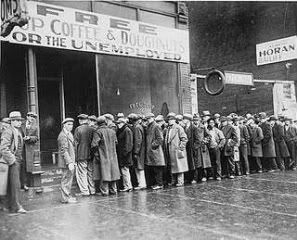This is excerpted from Burning the Midnight Oil for the Coalition Change Strategy, on the Burning the Midnight Oil blog hosted by the Daily Kos (thought to the best of my knowledge with neither the advise nor consent of kos).
In tonight’s thought, I continue thinking on the coalition change strategy, and in particular on how to expand the base of the coalition. The focus is on one particular dimension of building the coalition that is close to my heart, after my experience in working on this essential dimension of a green transport policy fight.
First Verse
 |
| Actually, the workers here are also better off … if exports to the US are balanced by imports from the US |
A little while back … oh, the summer or fall of 2006, if I recall correctly … I discussed an International Trade system that was the total opposite of the NAFTA model … focused, that is, on trade between producers in different countries, instead of being about surrendering national sovereignty on flows of wealth across national borders.
I just want to raise one point from that system tonight. Producers on both sides participate based on more than 50% of the “value added” of the product produced inside that country, entering qualifying product into a catalog, and importers in the foreign country bid in terms of the foreign currency, and the system regularly sorts out a working exchange rate to allow the largest possible number of bids to be met.
And in that system, the US$ stay in the US, with the dollars paid into the system by US importers providing the funds to pay US exporters, and the same way in the developing country. Everyone pays and everyone is paid in their local currency … only the goods cross borders.
For those of you unfamiliar with the thrilling details of the System of National Accounts … “Value Added” is a way of accounting for the sales price of finished goods by looking at the total price received at each stage of production.
Now, take something abstract, like a Shaker rocking chair. Who d’ya think is going to have a better chance of having more than 50% US Value Added … a small business producing furniture in, say, Knoxville, Tennessee … let’s call it Joe Public & Sons Furniture … or “Furniture R Us Incorporated, a wholly owned subsidiary of the WeSaySo Corporation”?
Which is going to get the best benefit from access to that catalog … Joe Public & Sons, used to selling to a mix of local and regional retailers and wholesalers, or Furniture R Us, with their access to the international connections of WeSaySo?
Obviously, NAFTA, with its heavy focus on cross-border “investment”, is tilted to the WeSaySo’s of the world. Who is looking out for the Joe Public & Son’s of the country?
Second Verse, Same as the First
 |
| Social security crisis in 20 years you say? … guess I’ve seen worse problems |
Also a little while back … also sometime in 2006, I’d guess … I discussed the big Social Security sham. That is the fiction that the monopoly producer of fiat currency somehow needs to “pile up money” in a cave somewhere, so Social Security payments can be met 30 years from now.
It’s all a fiction. Under Reagan, the Corporate Party, with agreement from both its radical reactionary wing inside the Republican party and its moderate wing inside the Democratic party, “fixed” social security by moving it from Pay As You Go to “Build Up A Surplus”.
While the “surplus is being built up”, what we are doing is shifting our tax system off of strongly progressive corporate income taxes and moderately progressive personal income taxes onto regressive capped payroll taxes. That was on the promise that, when the Boomers are mostly retired and we are in the demographic squeeze until they have started to die off in large numbers, the “surplus” will be drawn on by shifting the tax structure back, and using corporate and personal income taxes to “repay” the “special bonds” in the trust fund.
Well, this is obviously a case of I will pay you on Tuesday for a Hamburger Today. As the date of the transition comes, we start hearing the organs of the Corporate Party, like the Washington Post, start beating the drum of “saving” Social Security from a crisis that is unlikely to occur and which can be faced up to and solved if it does occur.
However, given the “crisis”, it is straightforward to “fix” it.
- Return the trust fund to Pay As You Go, by rebating the rate of overpayment in the previous year, rounding the rebate down to the next 0.25%.
- When we reach the point that there is no rebate to make, at that time the trust fund taps a levy on payroll income above the cap, up to half the Social Security payroll tax rate.
- And immediately shift Supplemental Social Security to funding by a levy on payroll incomes over the cap, up to half the current Social Security payroll tax rate.
So its a “cross that bridge when we come to it” system.
Again, I want to focus on one part of the proposal. Who is more likely to be run by more people with most of their personal salary income above the $100,000 cap on income taxed for Social Security … Joe Public & Sons, or Furniture R Us? Who is more likely to feel the most relief if their “business contributions” for the first $100,000 of each employee’s income goes down by 1% to 3%?
I reckon that when the Reagan Revolution with collusion from the Corporate Wing of the Democratic Party took the American worker for a ride on the Social Security Deal … which was then further locked into place under Bush-41 (whose legacy only looks good when set against his own son’s abysmal record) … so was small business.
Now, not all small business will benefit under the policy above. In particular, those raking it in will probably be in the same boat as the WeSaySo corporation. But those doing it tough … give them some immediate relief on their side of payroll tax, at the same time as putting a little more money in the pockets of their customers on payday, that could well be a good deal. Obviously their local Chamber of Commerce won’t tell them so … but then again, when Reagan wedged off those blue collar “Reagan Democrats”, it sure as hell wasn’t by getting the union bosses to say nice things about him.
Third Verse, Same as the First, Little Bit Louder and a Little Bit Worse
 |
| So, did’ya catch the game on Sunday? |
OK, and finally Connie Mae. This is “Carbon Neutral” finance corporation, along the general lines of Fannie Mae and Freddie Mac. However, what it finances is investments that reduce carbon emissions … either by reducing energy consumption, but also by increasing carbon neutral energy supplies.
The big twist … a twist that seems to go over the heads of the current main rivals in the Democratic field … is that loans do not have to be secured against mortgages. With the loans based on the amount of the investment that is self-funding, they can be tied to the utility payments that are being reduced by the investment.
Now, as any contractor or DIY retailer would recognize, I have already said the magic words … “finance”.
If a genuine, fully fledged Connie Mae is established, that means that contractors that are approved by Connie Mae could go out and hustle for business, and if they can find entirely self-funding improvements, they can contract to do the work with the word funded by payments on the utility bill that is being cut by the work. And, of course, the Connie Mae side of the utility payment is a fixed amount, while the payment for the electricity, natural gas, or water is only going to be heading in one direction over the next two decades.
Of course, it depends critically on how Connie Mae is set up … but if it is set up right, it can level the playing field between small business and big corporations in a big growth industry of the next two decades.
So, that’s the song.
Heck, I could keep on singing more verses of this same song. The fact is that while the radical reactionary wing of the Republican Party have relied on small business as part of its local ground troops, anytime there is a conflict of interest between big transnational corporations on the one hand and local and regional producers on the other hand … local and regional producers get the short end of the stick.
In terms of a Coalition Change Strategy, “all small business” is too diverse a group to target. Just as the Reagan Republicans when developing their strategy for undermining Democratic blue collar support, we have to be smart about understanding the different interests and motivations of different groups of small businesspeople.
The important thing, however, is to take the task seriously. If we are serious about pursuing the national economic interest, even when it runs counter to the vested interests of transnational corporations, we have the opportunity to offer opportunities to small business that the radical reactionaries simply cannot match.
We won’t get there, however, by talking at small businesspeople, and still less by talking at a stereotype of small businesspeople. We have to engage small businesspeople in discussion, and search for the common ground.
We have to take the time to get past established US Chamber of Commerce policy positions to get at what people are trying to accomplish, and then use ingenuity to try to develop alternate approaches that appeal to the same goals …
… and alternate approaches that also clearly offer the opportunity to make common cause with such an unlikely rabble as a bunch of dirty green hippies, commie labor union activists, and wild-eyed small-r republican small-n nationalist Energy Independence activists.
If nothing else, the exercise in taking people seriously when we don’t come to the table with similar ideas on policy will be good for our karma.
| Midnight Oil – Instant Karma … Instant karma’s gonna get you Gonna look you right in the face Better get yourself together darlin’ Join the human race How in the world you gonna see Laughin at fools like me Who in the hell d’you think you are A super star Well, right you are Well we all shine on Instant karma’s gonna get you |
|

